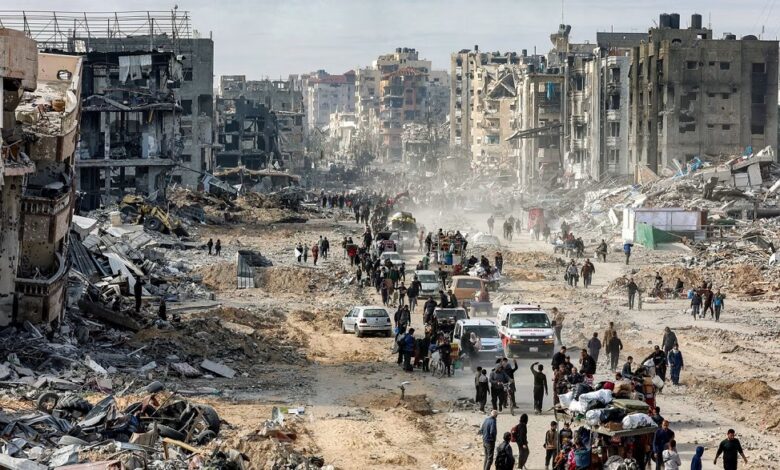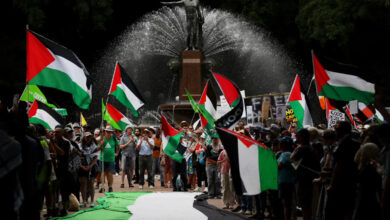
It’s been two years since Israel launched its war in Gaza and life in the enclave has never been harder.
With at least 67,173 people killed and another 169,780 injured, one in nine people alive in Gaza before the war has been wounded or is dead, the Ministry of Health in the enclave reported on Tuesday.
A “man-made” famine is spreading across the territory and the vast majority of people have lost their homes and livelihoods. Many have lost hope too, despite the indirect ceasefire talks between Israel and Hamas currently underway in Egypt.
Israel launched the war after the October 7, 2023 terror attacks in which Hamas and its allies killed more than 1,200 people and took 251 hostages to Gaza.
Israel’s conduct in the war has been such that international experts, including the International Association of Genocide Scholars, two leading Israeli human rights organizations and an independent United Nations inquiry, have concluded that Israel has committed genocide against Palestinians in Gaza – an accusation the Israeli government has consistently denied.
For people in Gaza, life has long become about survival. About trying, and almost always failing, to secure the basic necessities for their loved ones.
Here are the stories of a few of them, shared with CNN through messages and phone calls.
‘The hardest days we’ve ever lived’
For months, Mahmoud Nabil Faraj and his family have been surviving on one meal a day. But there have been many occasions when he had no choice but to forgo food altogether, he said, to make sure that his 7-year old son and 5-year old daughter, at least, could eat something.
“These are the hardest days we’ve ever lived,” he told CNN. “Our children are deprived of the basic foods needed to grow, and our bodies have become frail and weak due to the lack of nutrition.”
Most of the time now there is no food or water, he said. “When there is some, it barely meets the minimum requirements for survival. There are no fruits whatsoever. Milk and dairy products are unavailable. Eggs are 100% missing. Meat and poultry are also unavailable.”
Many people, himself included, are now suffering from frequent dizziness because of persistently low blood sugar, he said.
“The prices of basic goods are skyrocketing… only God knows how we manage to afford even that one meal,” he told CNN. When available – which is not often – a single kilogram (2.2 pounds) of sugar now sells for $150, he said.
Before the war, Faraj owned a grocery store and his wife ran an optometry center in Shuja’iyya, an eastern neighbourhood of Gaza City. Both businesses have been destroyed in Israeli attacks, as was their home, he said. They fled the area before the strikes.
“We used to eat the finest food and wear the nicest clothes,” Faraj said. “Now we are displaced in western Gaza.”
Faraj said he was 253 pounds before the war started two years ago. Now, he weighs no more than 154 pounds.
My siblings dream of gathering firewood
Raghad Izzat Hammouda has been hungry and malnourished for many months, surviving on a poor diet of small quantities of mostly canned food.
But it is her six younger siblings she is most worried about.
“They had beautiful dreams; they aspired to travel, get an education and obtain excellence certificates. But today, their highest dream is to gather firewood and fetch water, and they are happy if they eat a morsel of bread? Can you imagine that?” the 20-year-old from Gaza City told CNN.
She said her parents often skip meals and give all of the food they have to the children.
“My mother and father are suffering greatly. Like all of the parents in Gaza, when they see their children hungry and crying because they are thirsty and hungry,” she said.
Hammouda said there is no fruit or meat at the markets in Gaza, and that the few vegetables that are available are so expensive they remain out of reach.
“Before the war, my family’s food was varied and diverse… But now, unfortunately, none of that is available,” she said. “Right now, all our food consists of canned goods… canned fava beans, peas, canned meat, and so on … and legumes like chickpeas, lentils and beans.”
She said she has lost 10 relatives in the war, including her 80-year-old grandmother, Tamam, who she said was killed by Israeli forces.
“They did not allow us to bury her until a week after her death,” she said.
‘Shocked by how much I had changed’
Mohammed Saeed Al-Khatib was stunned when he saw a photo a friend took of him.
“I was shocked by how much I had changed in appearance. We no longer have mirrors, and I hadn’t seen myself in a long time,” he told CNN.
Al-Khatib reckons he has lost more than a third of his weight since the war started in Gaza, dropping from 143 kilograms (315 pounds) to roughly 90 kilos (200 pounds).
The 42-year-old is from the Al-Zahra neighborhood in Gaza City, a place he said used to be one of the most beautiful areas in the whole of Gaza.
Over the past two years, it has been destroyed by relentless Israeli aerial and ground attacks.
“My children’s lives changed drastically: no schools, no health care, no proper food or clean water. Diseases surround them from every direction,” he said.
Al-Khatib’s home and almost everything his family owned is long gone. He said they have been displaced more than six times, living in tents and rented apartments across Gaza.
Finding food and water is a daily struggle, he said. At many points during the past two years, Al-Khatib and his family had no choice but to take desperate measures to survive.
“We used spoiled flour infested with insects and worms just to feed the children. We cleaned and ate rotting vegetables, consumed rice unfit for human consumption, ate expired canned goods, and drank unsafe water,” he said.
Always thinking of family
Mohammed Matar says he had a good life before the war started.
He worked as a graphic designer and his family always had enough to eat and drink. Their financial situation was good enough to allow them to go out and have fun on a regular basis. And as someone who had always been on the heavier side, he had spent decades trying to lose weight, never quite succeeding.
It’s a life that seems so distant now that it’s almost impossible to imagine.
“My children suffer from health issues and malnutrition. One is 4 years old, the other one is 2,” he said.
“We buy one kilo of flour and try to make it last for two and a half days. Sometimes I go to sleep without dinner so that my son can go to kindergarten and at least eat half a loaf of bread in the morning,” he told CNN.
Matar said he can see the impacts of this lack of nutritious food on his own body. He has lost a significant amount of weight in the past two months and feels exhausted. His hands ache. Carrying a bucket of water to the second floor has become a task that is physically too difficult now, he said.
He and his family — his wife and two young children — were displaced from their home in the Al-Shati refugee camp in Gaza City to Rafah in the south early in the war.
When Israeli troops entered Rafah, the family moved to just west of Al-Qarara near Khan Younis. When the Israelis began closing in on that area, they fled to Deir al-Balah in central Gaza.
The rest of his family is scattered all over.
“My mother and two sisters are in Al-Maghazi (in central Gaza), one brother is in Gaza City, and I have a sister in Turkey. I am always thinking of them,” he said.
‘We have lost our normal life and hope’
Forty-year-old Eyad Amawi has been watching his children waste away despite his best efforts to keep them fed and healthy.
He told CNN they have all lost a significant amount of weight and are struggling with weakness. His youngest son, Youssef, who is only 4 years old, is suffering from liver inflammation and intestinal infections caused by severe malnutrition, he said.
“My wife and I often do not eat at all so there is enough food for the children. We adults reduce our portions, especially of bread, so the children can have it. But bread alone is not enough to survive without nutritious food. And to this day, meat, eggs, chicken, and other essential nutritious items are not allowed to enter,” he said.
Amawi and his family have been displaced in Deir al-Balah due to heavy bombardment in his neighbourhood in Gaza City. He said they have not eaten in a normal way since the war began.
“Sometimes we manage through small aid distributions or by buying flour when it is available during the tight blockade. Most of the time we rely only on lentils or rice, and in rare periods we managed to get some potatoes,” he said.
He said the war has changed every aspect of the family’s life. Several of his relatives have been killed and some of his nieces and nephews have been injured.
“These losses have left a deep wound in our family,” he said. “We have lost our normal life and lost hope. Our lives changed from stability and safety to constant fear; from having electricity, water and food to struggling to find the most basic essentials.”














